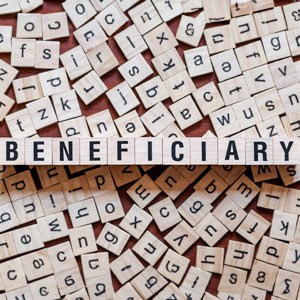
In this article, you can discover…
- What to consider when deciding who should inherit your assets.
- How to modify your beneficiary list.
- How to securely leave assets to a non-relative.
How Do I Determine The Appropriate Beneficiaries For My Assets?
Consider who you are comfortable with inheriting your assets. Most people initially consider biological children, but can come into play, as well.
For example, you may initially think to evenly split your wealth among three grown children, but would you like your grandchildren to inherit anything specific? If so, you can feel free to entrust a certain amount to your grandchildren when they reach a given age (such as 25) or anyone else you’d like to include.
Consider the goals you have for your loved ones and what you’d like to see done with your assets. What are your goals and what might your trusted loved one’s needs or goals be after you’ve passed?
What Should A Single Person With No Dependents Keep In Mind When Selecting Beneficiaries?
If you’re a , you may wish to consider close friends, nieces or nephews, siblings, charities, or organizations in your estate plans. You can choose certain amounts to be given to multiple people or causes. You can also have a trust put in place for a pet to provide for their care after you’ve passed away.
What Are The Steps To Legally Modify A List Of Beneficiaries?
Modifying a list of beneficiaries is not legally complex. It will involve either an amendment to the will or trust or a restatement of the document. An amendment simply changes a certain article of the document, whereas a restatement scraps the entire original document and begins again.
It’s essentially equivalent to amending or re-writing a contract, as estate plans are just that: a legal contract between yourself and whoever is set to inherit your wealth.
Additionally, changes to who gets what percentage of your assets can be easily adjusted by an estate lawyer to reflect changing wishes or dynamics between yourself and the beneficiaries. For example, an initial four-way even division of wealth between four grown children could be easily modified to reflect a 30-30-30-10 ratio.
How Can I Tell If My Decision To Modify Beneficiaries Is Emotional Vs. Sensible?
Ask yourself, did something just happen to cause an emotional response? If you’ve had a fight with a grown child the day before or been left alone instead of visited by grandchildren during a holiday, give yourself at least six weeks to think the situation over and reflect on the dynamics.
If a relationship seems broken, you may wish to include a provision wherein a beneficiary may still receive a gift if they reconcile with you before you pass away, or else they forfeit their inheritance by not reconciling.
It’s often advisable to leave yourself room to reconcile with family or for them to reconcile with you. Broken relationships can sometimes be mended or at least improved with a simple, unexpected phone call, email, or visit out of the blue.
What Considerations Should You Keep In Mind When You’re Leaving Assets To Non-Relatives, If Any?
Consider what. For example, you may wish to leave $10,000 to an elderly neighbor whom you’re close to. However, this neighbor is retired and on Medicaid, and a $10,000 lump-sum amount would disqualify her from Medicaid and inadvertently make her life harder.
It would be better in this case to establish a trust to release this money to her in a way that would be of help to her without threatening her Medicaid benefits.
A simpler situation might include leaving $10,000 to an old college friend you’ve known for years. This person has no special considerations to work around and can easily receive a lump sum to spend on a Super Bowl ticket, a down payment on a new car, or anything else they might like.
This would be described as an outright distribution and would be more likely if the beneficiary had few or no financial constraints to consider.
What Legal Protections Can I Set Up To Safeguard My Intended Beneficiaries?
Establishing a trust is the best way to help s. A trust allows for specific stipulations to be in place and can help protect an heir from being exploited or from squandering their inheritance.
Trusts can allocate funds for certain purposes (such as an education). They can also distribute smaller amounts of money over time, or when certain requirements are met (such as a beneficiary graduating college or turning 30).
The immediate release of money (also called “efficient transfer”) doesn’t protect the beneficiary, consider their unique circumstances, or encourage them to use their inheritance wisely. A trust, however, can be carefully drafted and tailored to suit your wishes and a beneficiary’s unique needs.
What Is The Most Impactful Thing To Consider When Choosing Beneficiaries?
Consider family dynamics. The repercussions of writing loved ones entirely out of a will can have consequences for your children, grandchildren, friends, and extended family. It’s often far simpler to will a smaller amount to a less preferred heir rather than to exclude them entirely.
Say you have a situation wherein you’re considering splitting your wealth between two grown sons (one of whom is successful and the other of whom has serious struggles in life) and the three children of the more successful son. Excluding the troubled son entirely can lead to a lawsuit after you’re gone – or even before. A five-way 20% split will prove simpler, emotionally safer, and less damaging overall.
For more information on Determining Appropriate Beneficiaries For My Assets, an initial consultation is your next best step. Get the information and legal answers you are seeking by calling (571) 260-0827 today.
